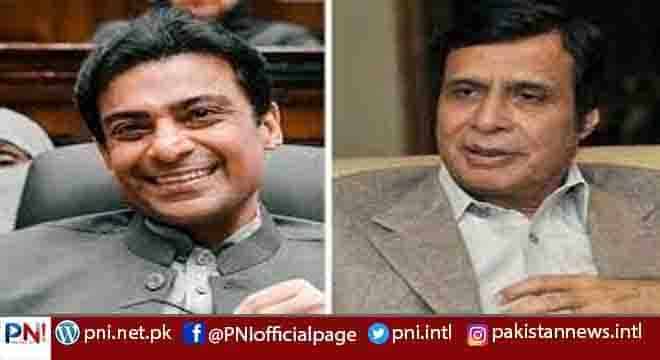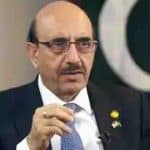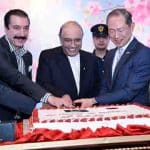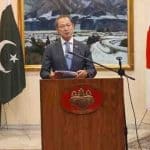ISLAMABAD 01 July (Online): After an hours-long hearing on the PTI’s petition against the Lahore High Court’s (LHC) order to recount the votes cast in the April 16 Punjab chief minister election today, and conduct a second round of voting if required, the Supreme Court on Friday said that this process would now take place on July 22.
The apex court issued the verbal order as a three-member bench, headed by Chief Justice of Pakistan (CJP) Umar Ata Bandial and comprising Justice Ijazul Ahsan and Justice Jamal Khan Mandokhail, took up the petition filed earlier today.
The LHC had passed its order on Thursday while hearing the PTI and the PML-Q’s pleas against Hamza’s election and oath-taking, requiring the Punjab Assembly to convene today at 4pm to conduct the recounting exercise, excluding the votes of PTI dissident lawmakers.
According to the high court, if the required majority for Hamza, which is 186 votes in the 371-member strong house, to stay the CM is not secured after recounting, which is a certainty after the exclusion of 25 votes cast by dissident PTI lawmakers, the election will be held again under Article 130(4).
According to Article 130(4), in the second round of voting, a member will not require 186 votes but simply needs a majority of those “present and voting” to be elected the chief minister.
Punjab Chief Minister Hamza Shehbaz and Punjab Assembly Speaker Chaudhry Pervez Elahi appeared before the court via video link as the PTI sought to defer the PA proceedings by seven days.
Earlier, Justice Ahsan remarked that it was clear the election could not be held today. However, he did not agree with the PTI’s request for a seven-day extension on account of its MPAs being out of the country. He went on to say that if there was no objection to Hamza continuing as CM, the only point of contention was the timeframe.
One of the lawyers present during today’s hearing contended that it would be more appropriate to hold the CM election after the by-elections on 20 Punjab Assembly seats, scheduled for July 17. To this, Justice Ahsan said the argument had weightage.
Justice Ahsan added that under the dissenting note in the LHC verdict, one more day could be given for holding the assembly session. “There should be an appropriate time for a revote,” he said.
One of PTI’s lawyers, Imtiaz Siddiqui, pointed out that the Election Commission of Pakistan (ECP) had not yet notified lawmakers on the reserved seats in the PA. At this, Justice Ahsan remarked that “the world would not come to an end” if the notification was not issued.
Subsequently, the chief justice summoned Hamza and Elahi, adjourning the hearing till 4pm.
When the hearing resumed, CJP Bandial, while addressing Hamza and Elahi, said that the PTI’s stance was that adequate time had not been given for the election. “Another question is who will run the province if the court allows for more time,” the CJP said.
According to the Constitution, a province can’t be run without a chief minister, he said. CJP Bandial also asked Elahi whether he had any objections to Hamza remaining chief minister. At this, Elahi said that ever since Hamza had been elected CM, police were “in control” of the provincial assembly.
Justice Ahsan said that there was no end in sight to the constitutional crisis in the province and called for solving it according to the Constitution.
CJP Bandial observed that the court was informed Elahi did not object to Hamza remaining the CM until the local government polls. However, Elahi contended that he couldn’t trust Hamza in the prevailing situation.
Justice Ahsan said that once the house was complete, the candidate who had the majority would become the CM. “We have summoned both of you (Hamza and Elahi) over this point.”
The second matter at hand is the lack of time in conducting the election, Justice Ahsan continued, adding that time could be provided for members within Pakistan to make it to the session.
Subsequently, Elahi said that if Hamza wanted to stay the CM till July 17, he should “determine his powers”. “He can stay the chief minister but he should not harass [our] assembly members,” he said.
Justice Ahsan replied by saying that the courts were open if any violence took place in the PA.
During the hearing, Awan urged the court to give orders for conducting free and fair elections. “It should also give instructions for notifying the reserved seats in the PA,” he said, adding that Hamza was not acceptable as the CM under any circumstances.
However, Justice Ahsan said that the court didn’t want to create a “constitutional vacuum”. He remarked that Elahi, the PTI’s ally, said one thing while the party said another.
He also observed that a run-off election would be conducted after two days. “Whoever has the majority in two days will become the chief minister.”
Awan said that a decision should be taken under Article 187 of the Constitution, which empowers the Supreme Court to issue all such directions, orders and decrees, as it deems necessary, and secure the attendance of any person and production of any document for doing complete justice in any matter before it.
“The court should give orders for a third person to hold clear and transparent elections,” he said.
However, CJP Bandial observed that Article 187 was not applicable in this case. “Three to five days would be appropriate for [holding] the run-off election,” Justice Bandial said. He went on to say that there were two options on the table: run-off elections in two days or Hamza remaining the CM till July 17.
“You are saying the CM should immediately be removed,” he told Awan. “Alternative arrangements can be made for two or three days, but not for long periods.”
Awan sought time from the court to discuss the matter with the PTI’s senior leadership and Chairman Imran. The court, subsequently, adjourned the hearing for half an hour, granting the PTI time for consultation.
At the outset of the hearing, PTI’s lawyer Babar Awan highlighted that one of the judges from the LHC bench had penned a dissenting note. However, Justice Ahsan pointed out that the judge in question had agreed with the majority decision on one point.
“It’s simple. The order says that 25 votes should be excluded from the 197 garnered [by Hamza],” he added.
Awan said that the PTI merely wanted the maximum number of lawmakers to be allowed to cast their vote. The CJP, however, pointed out that this was not mentioned in the PTI’s plea.
“We have come after reading your plea,” he said. “Basically, you do not believe that the decision is in your favour,” the CJP added. At this, Awan said that the PTI accepted the LHC decision in principle.
CJP Bandial then highlighted that four of the judges from the LHC bench had suggested holding the PA session today while one had suggested holding it tomorrow. Do you accept tomorrow as the date for the PA session, he asked Awan.
Justice Ahsan also enquired whether the MPAs who were unable to attend due to being out of the city/country could return within 48 hours.
During the hearing, Awan said that the PTI wanted to contest the election but “should be given a level-playing field”. He told the court that the Punjab chief minister election was held on April 16 in a session marred by chaos and violence. The police was called to the House after a scuffle broke out, he said.
Justice Ahsan disagreed with Awan’s stance that PA proceedings could wait until all lawmakers were available. He reiterated that the LHC had instructed that the votes of 25 dissident PTI lawmakers should be excluded in the recounting exercise.
“After the exclusion of these 25 votes, Hamza’s election does not remain valid,” he said, adding that there was “no need for a simple majority of 186 votes in the second round”.
“Your stance is your members have gone abroad,” the judge said, addressing Awan.
However, Awan clarified that he was not asking to wait for the lawmakers. But “adequate time should be provided so that the maximum number of members can participate in the voting,” he added.
During the hearing, CJP Bandial questioned how the apex court could intervene in the matter of scheduling the PA session. “Should we fix July 2 as the date for voting, as suggested by the dissenting judge?” he asked.
“Are you ready to vote tomorrow?” the CJP further asked Awan. Justice Ahsan further remarked that those members who were in Pakistan could reach within a day.
At this point, the PTI’s lawyers asked to defer the re-election process for seven days to which Justice Ahsan remarked that this would not be appropriate.
He further said that it would not take lawmakers who were in the country more than 24 hours to reach the assembly.
Awan reiterated that the Election Commission of Pakistan had not yet notified lawmakers on the five reserved seats in the PA. At that, the CJP questioned: “Do you want that the province remains without a chief minister for seven days?”
Justice Ahsan asked about the Constitution’s stance on who runs the province in the absence of the CM. “Who can run the province when the chief minister is not available?” he asked.
He added that at the time of the Punjab CM’s election, there was no clarity on Article 63-A, which pertains to disqualification on grounds of defection.
At one point, Awan told the court had he had 10 days in mind but had instead asked for seven.
Justice Mandokhail said that the matter of adequate time should first be concluded before deliberating on the remaining points. Justice Ahsan then said the governor could ask a chief minister, who was elected in a lawful manner, to continue working.
Justice Ahsan observed that there would not be a provincial cabinet without a chief minister.
The CJP further stated that the PTI had to prove its majority in the House. “Twenty-five votes have been excluded. How many members does that leave the PTI with?”
PTI’s lawyer Faisal Chaudhry replied that after the exclusion of 25 members, the party’s numbers had gone down to 169.
The court observed that this meant the PTI did not have the majority on its side, to which Chaudhry replied by saying that nobody had the majority.
During the hearing, CJP Bandial remarked that giving the reins of the province to the governor would be “unconstitutional”. He observed that the by-elections would be held on 20 seats in the provincial assembly on July 17. “How can the province be brought to a halt till then?” he asked.
“According to the Constitution only elected representatives can run a province,” he said, giving the PTI half an hour to ponder this point before adjourning the hearing.
The province of Punjab through the chief secretary, PA Deputy Speaker Sardar Dost Muhammad Mazari, the principal secretary to the Punjab Governor, the PA secretary and Punjab CM Hamza were named as respondents in the PTI’s petition.
PTI members Mohammad Sibtain Khan, Zainab Umair. Mian Muhammad Aslam Iqbal, Syed Abbas Ali Shah and Ahsan Saleem Baryar asked the apex court to modify the LHC order to the “extent of provision of adequate and sufficient time to hold [the PA] session” so that members could be issued notices and were able to “exercise their right to vote for the election of the Punjab chief minister in [a] fair and transparent manner”.
The petitioners urged the court to remove Hamza as CM pending the election process and requested it to issue directives for holding a “free and fair” election for the post of the province’s chief executive.
Moreover, they requested the court to suspend the election process till the pendency of their petition.
And “since the 25 votes of defectors are admittedly not to be counted, there is no need to repeat that exercise of recounting and hence the notification issued for the chief minister is liable to be quashed as duly noted in the minority judgment,” the petition added.
In the petition, the party also said that three of its MPAs were currently not in Pakistan as they had gone to Saudi Arabia to perform Haj. “Eidul Azha is only nine days away, therefore, many members of the provincial assembly are busy in their hometowns and are unable to participate in the proceeding[s] on such a short notice,” the petition added.
The PTI also pointed out that lawmakers on five reserved seats in the PA had still not been notified in accordance with the LHC’s earlier directives. On Monday, the high court had instructed the Election Commission of Pakistan to notify PTI members on the five reserved seats which had fallen vacant following the de-seating of the dissident lawmakers.
The party also argued that many MPAs were busy with the political campaign in their constituencies for the upcoming by-elections in the province.
Therefore, the PTI and the PML-Q were at a “great disadvantage” as three MPAs were away on Haj, five were yet to be notified, 20 were busy in their constituencies and six were “available” due to domestic engagements, the petition said.
“The honourable learned high court has erred to appreciate that any political process requires fairness with due and adequate notice. The direction to hold the session on such short notice undermines the whole stance by giving relief to the petitioner and (strangely) putting his political party at the disadvantageous position at the very same time,” it said.
Meanwhile, PTI leader Fawad Chaudhry hoped that the apex court would take up the plea and stop the PA session scheduled for today.
Speaking to the media outside the SC, PTI’s lawyer Faisal Chaudhry said the petition had been filed against the LHC’s “illegal” ruling.
He said the LHC order had several “ambiguities”, adding that adequate time should be provided if an election for the Punjab chief minister’s slot was to be held.
“The LHC’s decision to hold the election this early is beyond comprehension,” he said, adding that some of the PTI members had gone for Haj. He further raised the question that if “the first election was incorrect, how can another round be held?”
The lawyer said CM Hamza should be removed, adding that PA Speaker Parvez Elahi’s rights had been trampled. He also said that the deputy speaker, who had been directed by the LHC to preside over today’s session, was a “controversial figure”.
He said he was expecting the SC would hear the petition “on this important matter” today.
After the LHC’s order of excluding the votes of 25 defecting members, Hamza’s tally has now been trimmed to 172 votes, which no longer holds the strength of the house. Therefore, as per the court’s order, a re-election is bound to be held.
On Thursday, a five-judge LHC bench had ordered a recount of votes cast in the election for the Punjab CM after excluding 25 votes of defecting MPAs of the PTI, and in case a candidate fails to secure a majority, go for a run-off poll where a contender requires a majority vote of the members present in the house.
“The presiding officer (deputy speaker) of the election held on April 16 is, therefore, directed to recount votes after excluding 25 votes of the defecting members,” stated the short order of the majority decision handed down by Justice Sadaqat Ali Khan, Justice Shahid Jamil Khan, Justice Shehram Sarwar Chaudhry, Justice Sajid Mahmood Sethi and Justice Tariq Saleem Sheikh.
Justice Sethi concurred with the short order, however, recorded separate reasons in a dissenting note.
The order explained if a candidate failed to secure the majority vote (of the total membership of the house) required under Article 130(4) of the Constitution, the presiding officer (the deputy speaker, in this case) shall proceed for a second and further poll unless a candidate secured majority votes (of the members present).
The bench maintained the session would not be prorogued until the election process is completed and the presiding officer intimated the result to the governor. “The governor shall perform his duty, under Article 130(5), of administering oath at any time before 11am the very next day.”
The bench further observed that they could not ignore the disorder in various sessions of the provincial assembly, therefore directed that any attempt of disorder from any quarter would be taken as contempt of court and proceeded against accordingly on formal information by any individual.
In the opening paragraphs of its short order, the bench ruled that the Supreme Court opinion on the presidential reference regarding votes of defectors was applicable to the Punjab chief minister’s election held on April 16.
The judges, however, did not quash the notification of Hamza as the CM or direct for a second poll, as sought by the appellants. They clarified that Hamza would cease to be the CM if he lost the required majority (of the members present in the house in case of a run-off poll) after exclusion of 25 votes (of the PTI defectors).
“In this eventuality, functions performed and powers exercised by Hamza Shehbaz as chief minister and his cabinet… shall be protected under the de facto doctrine,” the judges ruled.
In his separate note, Justice Sethi agreed with the majority decision on the retrospective enforcement of the SC opinion, disposing of the petitions concerning the CM’s oath by the NA speaker and refusing the prayer to declare Hamza’s election illegal, but disagreed with the date of the recount, saying reasonable time was necessary for enabling MPAs, hailing from far-flung areas, to join the session. He suggested the assembly could have met on July 2 at 4pm.
The judge observed that the direction to directly hold a second poll, in no way, would nullify any direction of the Supreme Court. He explained that after the SC opinion on the defectors’ vote, Hamza could not be allowed to hold the CM’s office, adding it would give him a political advantage over the other candidate.
Justice Sethi set aside the notifications declaring Hamza as the CM and about cessation of Usman Buzdar to hold the office for being illegal and without lawful authority. He restored Buzdar as the CM, as he was on the said date, but declared that all acts/actions executed by Hamza as the CM and his cabinet, would not be adversely affected by his order and proposed reasons.
Follow the PNI Facebook page for the latest news and updates.









